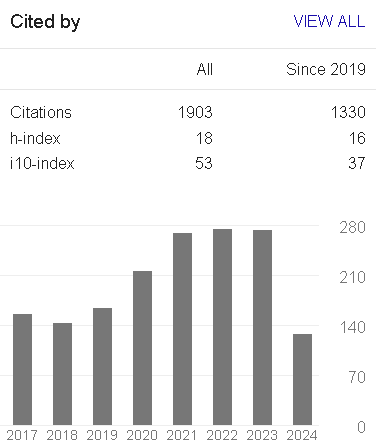A Trivial and Dependable Faith Scheme for Clustered Wireless Sensor Networks
Keywords:
Reputation, self-adaptivity, trust management, trust model, wireless sensor networkAbstract
Wireless Sensor networks (WSN) are a special type of wireless networks. The clustered wireless sensor networks are incapable of satisfying the resource efficiency and dependability of a trust system because of the high overhead and low dependability. A Lightweight and dependable trust system for wireless sensor networks are used to WSNs, which employees the Clustering Algorithm. A lightweight trust decision-making scheme is based on the nodes’ identities in the clustered WSNs, which is suitable for such WSNs because it facilitates energy-saving. Due to canceling feedback between cluster members and cluster heads, this approach can significantly improve system efficiency while reducing the effect of malicious nodes. The Cluster heads take on large amounts of data forwarding and communication tasks, a dependability -enhanced trust evaluating approach is defined for co-operations between CHs. This approach can effectively reduce the networking consumption and thus prevents malicious, selfish, and faulty Cluster heads. A self-adaptive weighted method is defined for trust aggregation at Cluster head level. Even though this enhances the energy efficiency and confirms the trustworthiness of nodes that participate in the communication. This approach surpasses the limitations of traditional weighting methods for trust factors, in which weights are assigned subjectively. LDTS uses the benefits of an energy-efficient, less memory and communication overhead in wireless sensor networks.
References
W. B. Heinzelman, A. P. Chandrakasan, and H. Balakrishnan, “An application-specific protocol architecture for wireless microsensor networks,”IEEE Trans. Wireless Commun., vol. 1, no. 4, pp. 660–670,Oct. 2002.
D. Kumar, T. C. Aseri, and R. B. Patel, “EEHC: Energy efficient heterogeneous clustered scheme for wireless sensor networks, Comput.Commun” vol. 32, no. 4, pp. 662–667, Apr. 2009.
Y. Jin, S. Vural, K. Moessner, and R. Tafazolli, “An energy-efficient clustering solution for wireless sensor networks,” IEEE Trans.Wireless Commun., vol. 10, no. 11, pp. 3973–3983, Nov. 2011.
O.Younis and S. Fahmy, “HEED: A hybrid, energyefficient, distributed clustering approach for AdHoc sensor networks,” IEEE Trans. Mobile Comput., vol. 3, no. 4, pp. 366–379, Oct. 2004.
S. Ganeriwal, L. K. Balzano, and M. B. Srivastava,“Reputation-based framework for high integrity sensor networks,” ACM Trans. Sensor Netw, vol.4, no. 3, pp. 1–37, May 2008.
Y. Sun, Z. Han, and K. J. R. Liu, “Defense of trust management vulnerabilities in distributed networks,” IEEE Commun.Mag., vol. 46, no. 2, pp.112–119, Feb. 2009. [7] H. Yu, Z. Shen, C. Miao, C. Leung, and D. Niyato, “A survey of trust and reputation management systems in wireless communications,” Proc. IEEE, vol. 98, no. 10, pp. 1752–1754, Oct. 2010.
R. A. Shaikh, H. Jameel, B. J. d’Auriol, H. Lee, and S. Lee,“Group-based trust management scheme for clustered wireless sensor networks,”IEEE Trans. Parallel Distrib. Syst., vol. 20, no. 11, pp.1698–1712, Nov. 2009.
F. Bao, I. Chen, M.Chang, and J. Cho,“Hierarchical trust management for wireless sensor networks and its applications to trust-based routing and intrusion detection,” IEEE Trans. Netw. Service Manag, vol. 9, no. 2, pp. 169–183, Jun. 2012.
G. Zhan, W. Shi, and J. Deng, “Design and implementation of TARF:A trust-aware routing framework for WSNs,” IEEE Trans. Depend.Secure Comput., vol. 9, no. 2, pp. 184–197, Apr. 2012.
E. Aivaloglou and S. Gritzalis, “Hybrid trust and reputation management for sensor networks,”Wireless Netw., vol. 16, no. 5, pp. 1493–1510, Jul. 2010.
A.Rezgui and M. Eltoweissy, “A reliable adaptive service driven efficient routing protocol suite for sensor-actuator networks,” IEEE Trans. Parallel Distrib. Syst., vol. 20, no. 5, pp. 607–622, May 2009.
G. V. Crosby, N. Pissinou, and J. Gadze, “A framework for trust-based cluster head election in wireless sensor networks,” in Proc. Second IEEE Workshop on Dependability and Security in Sensor Networks and Systems, 2006, pp. 10–22.
R. Ferdous, V. Muthu kumarasamy, and E.Sithirasenan, “Trust-based cluster head selection algorithm for mobile ad hoc networks,” in Proc. 2011 Int. Joint Conf. IEEE TrustCom-1111/IEEE ICESS-11/FCST-11, pp. 589–596.
Downloads
Published
How to Cite
Issue
Section
License
Copyright (c) 2014 COMPUSOFT: An International Journal of Advanced Computer Technology

This work is licensed under a Creative Commons Attribution 4.0 International License.
©2023. COMPUSOFT: AN INTERNATIONAL OF ADVANCED COMPUTER TECHNOLOGY by COMPUSOFT PUBLICATION is licensed under a Creative Commons Attribution 4.0 International License. Based on a work at COMPUSOFT: AN INTERNATIONAL OF ADVANCED COMPUTER TECHNOLOGY. Permissions beyond the scope of this license may be available at Creative Commons Attribution 4.0 International Public License.


